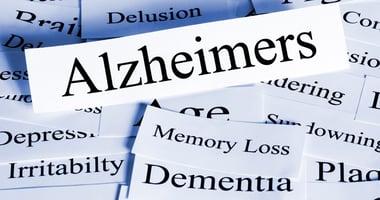Could THC Be Leveraged in Alzheimer’s-Related Agitation Management?
 Dronabinol (synthetic THC) may be a safe and effective pharmacologic option for managing agitation in adults with Alzheimer’s disease, according to a study published last week in the American Journal of Geriatric Psychiatry.
Dronabinol (synthetic THC) may be a safe and effective pharmacologic option for managing agitation in adults with Alzheimer’s disease, according to a study published last week in the American Journal of Geriatric Psychiatry.However, given the study's enrollment size and three-week duration, the findings should be considered preliminary.
Why It’s Clinically Relevant
Agitation is a great source of distress for patients with Alzheimer’s as well as their caregivers. Current treatments such as antipsychotics are only modestly effective and come with significant safety issues.
Why Dronabinol?
Agitation can be construed as an exaggerated behavioral reaction to fear and anxiety. Cannabis has been linked with anxiolytic effects, but unregulated and potent plant-based products pose risks. Dronabinol is an FDA-approved, generically available THC formulation that may represent a safer way to harness this anxiolytic potential.
How It Worked
Seventy-five older adults (average age 78.5) with a diagnosis of dementia due to Alzheimer’s and clinically significant agitation were recruited from five medical centers along the East Coast.
Participants randomly received three weeks of dronabinol (5mg daily week one, 10mg daily weeks two and three) or placebo. All participants continued with their existing medications and were provided with behavioral and environmental agitation interventions.
By the Numbers
After three weeks, participants in the dronabinol group showed a statistically greater rate of decline in their agitation symptoms—as assessed with the Pittsburgh Agitation Scale—relative to placebo: an average 0.74-point greater decline on the 0-16 scale, corresponding to a moderate effect size of 0.53.
The medication was also well-tolerated. The researchers noted that while dronabinol might be associated with greater somnolence, there was no indication of an increased risk of falls, delirium, or cognitive decline.
The Other Side
While trending in the right direction, the study’s co-primary outcome—agitation or aggression decline as assessed with the Neuropsychiatric Inventory, Clinician Version—did not reach statistical significance. Dronabinol also did not seem to provide any benefits related to sleep, delirium, or participating in daily activities.
Further, since the number of serious adverse events was low, the researchers could not make any meaningful statistical comparisons.
What’s Next
The researchers said the findings were promising but “tentative, meriting more robust replication.” They suggested that future trials incorporate longer follow-up, include additional types of dementias, and use digital tools to assess symptoms in real-time.
For Related Info:
FDA Approves Rexulti for Agitation Associated With Dementia Due to Alzheimer’s Disease
FDA Approves Rexulti for Agitation Associated With Dementia Due to Alzheimer’s Disease
(Image: Getty Images/iStock/Inna Dodor)





